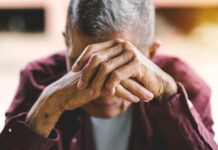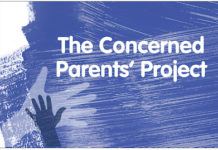Recovering Myself
I have known altered states of consciousness since I was a child. I clearly remember staring into the mirror in my mother’s bathroom and...
Elder Eyes Wide Shut
There is no universal moral code: Elder law and the injustice and inhumane practice of legal guardianship are a calculated effort by the court, the attorneys, and the healthcare system.
We Are The Ones
My public writing has brought my mother and I closer together than we’ve been in decades. There have been disagreements. But now, my almost ninety-year-old mother tells me she reads everything I write. She recently told me that she’s glad I see things so clearly.
Rock Bottom: When You Are in Your Darkest Moment
The one big lie that your mind will tell you when you are in that dark night: I am never going to feel okay again. This is the lie that drives people to self-destruction. It’s also the lie that keeps dynamic, complicated individuals captive in a system that says: your struggle is a permanent and defining feature of your brokenness.
The Continuing Evolution of Mad in America Continuing Education
The pharmaceutical industry has long funded CEU and CME curriculums, with the predictable result that the knowledge base, where it exists at all, is tainted by commercial interest. We have a critical vacuum to fill, and intend to keep doing so until the field is fully saturated with unbiased professional education.
A “Hot-Potato” Topic and a “Rational” Book
Rational Suicide, Irrational Laws is an excellent book that explores the criminalization and decriminalization of suicide. It analyzes laws by which “mental health” professionals and organizations are held accountable or “liable.” It exposes horrific contradictions in how laws are applied, particularly problematizing the assumption that people who kill themselves are suffering from a “mental illness.” There is much in this book that makes me want to stand up and cheer.
When Violence Hits Home, Can We Keep Growing?
We want to share conversation we had coming out of these events in the hopes it might help others explore how to keep growing emotionally in an uncertain and sometimes violent world.
Survey on Emotional Distress and Mental Health Diagnosis: An International Campaign to Include “Regular...
As researchers and practitioners, we are deeply troubled by the continuous narrowing of options available to people experiencing emotional difficulty. We believe that a variety of mental health approaches should be available to people from all walks of life and that we need to involve ordinary people in new kinds of conversation on this topic.
Beyond Pills: UK Parliament Must Support Social and Psychological Services Instead
Davies calls on the UK Parliament to support the Beyond Pills initiative, and follow the evidence to put social and psychological help first.
Let’s All Support Stephen Sheller’s FDA Petition to Revoke the Pediatric Approval of Risperdal
Thanks to Ginger Breggin for posting about Stephen Sheller's FDA Petition to Revoke the Pediatric Approval of Risperdal on her Facebook Page. Many of you know that Mr. Sheller recently settled a case against Johnson & Johnson over Risperdal causing breasts to grow in a young boy. What is not yet well-known is that on July 27, 2012, Mr. Sheller filed what is known as a "citizen's petition" to revoke the approval of Risperdal (risperidone), and its cousin Invega, for use on children and youth.
“I Was Just Following Orders”: a Seroquel Suicide, a Study Coordinator, and a “Corrective...
Out here in Minnesota, where the snow is gently falling, many of us are hunched over our computers, puzzling over a document just posted by the state Board of Social Work. It concerns the death of Dan Markingson (or as the document calls him, “Client #1”). Markingson, of course, was a young man under a commitment order who was coerced into a profitable Seroquel marketing study at the University of Minnesota over the objections of his mother, and whose condition spiraled downward until he committed suicide.
Exploring Psychiatric Drug Withdrawal: A Town Hall Discussion Series
Our new discussion series aims to explore what we do and don’t know about safe withdrawal from antidepressants, antipsychotics, benzodiazepines and stimulants.
How drug companies continue to hide the true story of Tamiflu and other drugs...
I’ve been reading Dr. David Healy’s new book, Pharmageddon, and while some of it may seem like old news, I was struck by his...
What is a Simple Way to Prevent the Onset of Physical Disease?
One thing that amazes us is that even though information linking nutrition to physical health is quite advanced, and generally very prominent in the media as well as in public awareness, people seem to be surprised when told that nutrients are essential for brain function. It may be silly to remind everyone of this, but we need to begin with this simple fact: the brain is part of the body. But to add some heft to this point, let us also recall that the brain is the organ of the body with the greatest metabolic demands (the heart is second).
The Next Generation of the Mad Movement in NYC Looks Like This
It’s a Saturday afternoon in mid-June and there’s about 150 of us on the ground floor of a low income housing building on the Lower East Side of Manhattan. The Institute for the Development of Human Arts is holding their founding event: “Making New Meaning: A School for Innovative Voices & Visions.”
What Can We Learn From the Asylum?
My historical study of the Essex asylum, just outside London, finds that those who were admitted showed significant disturbances of behaviour or evidence of organic disease. Almost two-thirds of those who had psychological, as opposed to organic, disorders were discharged recovered or improved (mostly recovered).
Ernst Rüdin: The Founding Father of Psychiatric Genetics
In a 2013 edition of the Journal of the History of Biology, Norbert Wetzel and I published an article on the Swiss-German psychiatric geneticist Ernst Rüdin (1874-1952) and his close colleagues, and how their work and crimes in the Nazi era have been discussed or ignored by contemporary psychiatric genetic writers and researchers. Here I would like to summarize the main points we raised in that article, and to make several additional observations. Whether Rüdin reluctantly aided and helped implement the “euthanasia” killing program in support of the war effort, or more likely, that he saw it as the crowning achievement of his decades of psychiatric genetic research based on racial hygienic (eugenic) principles, is an issue that may be decided in the future.
Thank You Notes: #ForTheKids
This short blog is inspired by the always entertaining and witty Thank You Notes ritual Jimmy Fallon does on the Tonight Show every week. It’s intended to be funny, but of course not as funny as Jimmy Fallon; he’s the best. People say I am funny, and have a great face for radio, but come on… how funny can you be when you talk about mental health and drugging kids?
Embracing Movement Diversity
The psychiatric survivor movement (and our overall “movement,” some of whom don't identify as psych survivors) is about as diverse and varied as the world itself. We are becoming perhaps the largest social justice movement ever to exist. Almost all women and queer people have been categorized by DSM diagnoses for being women (PMS, postpartum depression) or queer (homosexual, gender identity disorder), not to mention all the other groups who have been affected. Everyone is a survivor of the effects of the psychopharmaceutical industry on our consciousness.
Integration of Physical and Mental Health
Integration of physical and "mental health" care has been a popular topic in psychiatric circles in recent years. I've never been entirely clear about the nature of this proposed integration of psychiatry with primary care, though from what I've gathered, it sounds like there will be a psychiatrist, or other mental health worker, attached to primary care practices, either in the flesh or via computer screens. What has always been crystal clear, however, is that the proposal would entail a huge expansion of the psychiatric net.
The Three Most Important Facts About Psychiatric Drugs
Psychologist and educator Michael Corrigan was a guest on my radio show and brought up some questions about how to communicate with people about psychiatric drugs. Specifically, he asked, “What are the three most important things for anyone to know about psychiatric drugs?” Here is my answer.
Process Oriented Approaches to Altered and Extreme States of Consciousness
When John Herold went to see a Process Work counselor, they talked about how his experience of extreme states had been disruptive in his life, but how these states also had value. The counselor compared John's experience with drinking an entire bottle of Tabasco sauce all at once. Why not instead, the counselor suggested, "try being just a little psychotic all the time?"
The Concerned Parents’ Project: 31 Questions
The Concerned Parents’ Project grew out of the idea that there may be parents out there who are confused and bewildered by the mixed messages on what it is to have normal and healthy childhood experiences. We posted a new question and answer for parents each day in March.
Resolving to Make This Year Mean More
Every year around this time, millions of people make their New Year’s resolutions. In many ways, our resolutions mirror the willful approach that is needed to overcome psychological conditions, even those of a severe nature. We must be cautious about agents which serve to dull us to our particular circumstances and state of mind, whether it be medications or otherwise.
Mad Camp Europe: My Journey from Ward Violence to Healing and Community
If we want to advocate for a better mental health system, we have to integrate our own shame. And that is what happened to me at Mad Camp.





















